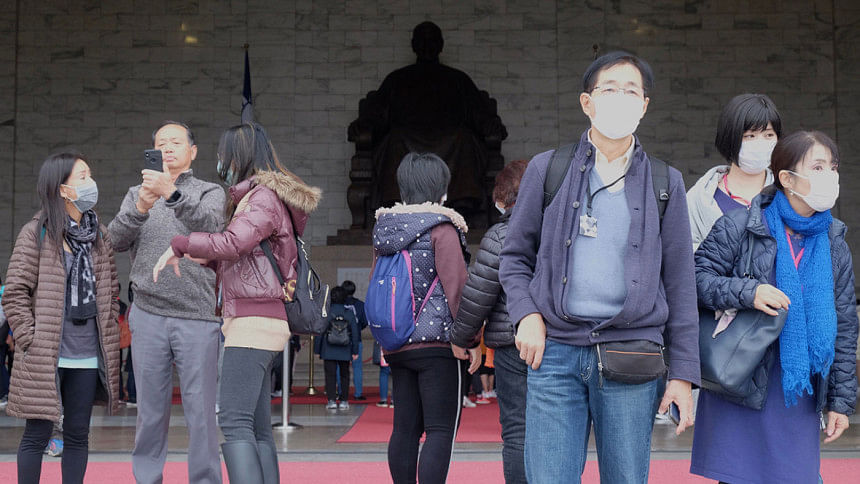Foreigners prepare to leave as China virus toll leaps to 106

The United States and other nations raced to get their citizens out of the locked-down Chinese city at ground-zero of a virus epidemic on Tuesday, as the death toll surged to 106 and the number of confirmed infections doubled to over 4,500.
The deadly virus, which experts believe emanated from a wild animal market in the city of Wuhan last month, has triggered a desperate Chinese containment effort after spreading nationwide and to more than a dozen other countries.
The government has sealed off Wuhan and other cities in central Hubei province, effectively trapping more than 50 million people, including thousands of foreigners, in a bid to contain the virus as the high-travel Lunar New Year holiday unfolds.
As those trapped in Wuhan have become increasingly anxious, governments have scrambled to devise ways to safely get their citizens out of the city of 11 million.
The United States, France and Japan are among those to have announced plans for airlifts, but nearly a week after the lockdown the evacuations have yet to happen.
A chartered US-bound flight had been scheduled to leave Wuhan on Tuesday with consular staff and some American citizens.
But the State Department said that had been postponed to Wednesday, without giving a reason.
France has also said it intends to fly its citizens out of the city in the middle of this week, and Japan has similar plans.
Several other countries also were working to repatriate their people, while Germany said it was considering doing so.
The virus can be transmitted between people, although scientists have yet to determine how contagious it is and exactly the way it is spread.
In bids to stop huge numbers of people coming into close contact with each other, China has imposed tight transport restrictions in other parts of the country.
It has extended the Lunar New Year national holiday into next week.
The education ministry on Tuesday also said the spring semester for schools and universities nationwide would be postponed, without giving a resumption date.
- Death toll climbs -
Despite the unprecedented measures, the virus has showed little sign of slowing down.
The national health commission on Tuesday said 26 new deaths occurred in the preceding 24 hours, bringing the nationwide total to 106.
Confirmed infections in China also jumped to 4,515, it said, up from 2,744 on Monday.
There were nearly 7,000 more cases suspected and awaiting confirmation, according to the commission.
The virus has also continued to spread around the world.
On Monday, the first infections were confirmed in Germany, Canada and Sri Lanka.
Fears over containment were heightened on Sunday when Wuhan's mayor, wearing a medical mask, revealed at a press conference that five million people had left the city for other parts of the country during the massive travel rush that precedes the New Year holiday.
President Donald Trump said the United States has offered Beijing "any help that is necessary" in combatting the virus.
But the United States, Turkey and Germany were among nations urging their citizens to "reconsider" all travel to China.
Malaysia on Monday banned visitors arriving from Hubei.
Landlocked Mongolia -- which is heavily dependent on trade with China -- took the drastic step of closing the border with its huge neighbour to cars.
Mongolia also cancelled classes until March 2 and suspended large public gatherings.
- Desperate efforts -
Medical facilities have been overwhelmed in Wuhan, which has become a near ghost-town.
China has deployed hundreds of military medics to ease the pressure, and started building two hospitals with the aim of finishing them in just 10 days.
AFP reporters saw hundreds of mask-wearing workers toiling around the clock to assemble one of the pre-fab field hospitals.
Construction began just days ago but the outline of a floor was already taking shape and electrical switchboards were up on Monday.
"We have to work fast to combat the epidemic," a worker in his 30s, who refused to give his name, told AFP.
Stressed Wuhan residents living under the quarantine expressed fears for the health and dwindling supplies at home.
"I'm getting more concerned every day," Do Quang Duy, a 32-year-old Vietnamese masters student in Wuhan, told AFP.
- Fighting spirit -
But Wuhan's people, who have a reputation in China for resilience, sought to project a fighting spirit.
Quarantined residents shouted "Go Wuhan" from their windows, according to videos posted online.
A building lit up the night sky late on Monday with those words in red.
The World Health Organization last week stopped short of declaring the outbreak a global emergency, which could have prompted a more aggressive international response such as travel restrictions.
But the WHO on Monday admitted making an error in originally assessing the virus' worldwide threat as "moderate", issuing an update late on Sunday to say the risk was actually "high at the global level."
WHO chief Tedros Adhanom Ghebreyesus travelled to Beijing this week for discussions with Chinese officials to coordinate on the crisis.

 For all latest news, follow The Daily Star's Google News channel.
For all latest news, follow The Daily Star's Google News channel. 








Comments